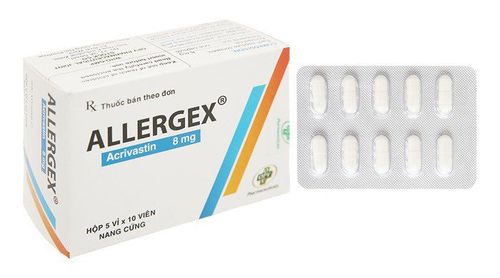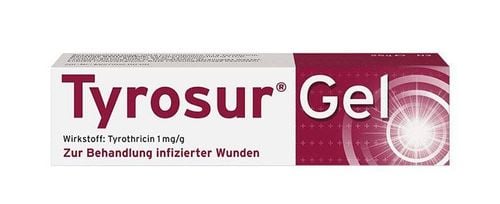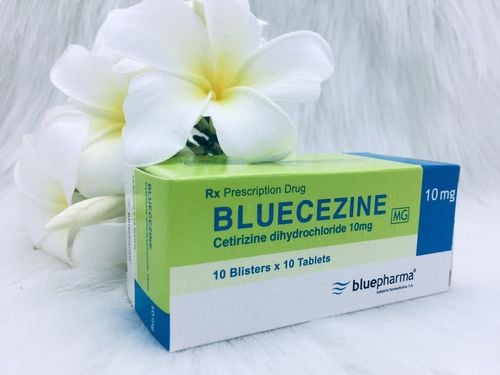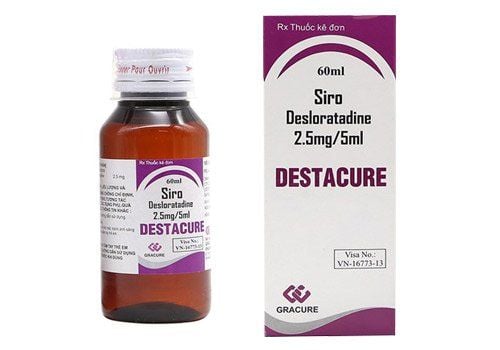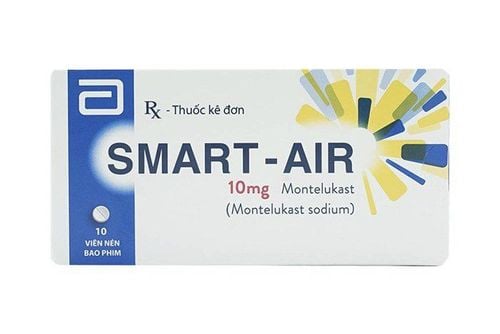This is an automatically translated article.
Asthmatin 10mg is used to treat bronchial asthma and relieve symptoms of allergic rhinitis. Asthmatin is usually prescribed for adults and children 6 months of age and older.
1. What is Asthmatin 10mg?
What is Asthmatin 10mg? Asthmatin is a drug whose active ingredient is Montelukast, in the form of Montelukast Sodium. Asthmatin is available in the form of 10mg film-coated tablets.
Asthmatin 10mg is indicated for use in the following cases:
Prevention and long-term treatment of bronchial asthma in adults and children 12 months of age and older. Symptomatic relief of allergic rhinitis: seasonal allergic rhinitis in adults and children 2 years of age and older; perennial allergic rhinitis in adults and children 6 months of age and older. Contraindicated for use in people who are allergic or hypersensitive to Montelukast or any of the ingredients in Asthmatin 10mg.
2. How to take Asthmatin 10mg
Asthmatin 10mg should be taken once a day. Time to take medicine:
Patients with bronchial asthma: should take the medicine in the evening. Allergic rhinitis: depending on the needs of each patient to have an appropriate time to take medicine. Patients with both asthma and allergic rhinitis: take the drug in the evening. Dosage
Asthma, allergic rhinitis:
Adults and adolescents 15 years of age and older: 10 mg/time x 1 time/day. Children 6-14 years old: 5 mg/time x 1 time/day. Children 2 - 5 years old: 4 mg/time x 1 time/day. Children 12 - 23 months old with asthma: 4 mg/time x 1 time/day. Children 6 - 23 months old with perennial allergic rhinitis: 4 mg/time x 1 time/day. Currently, the safety and effectiveness of using Asthmatin 10mg in children under 12 months of age with bronchial asthma and children under 6 months of age with perennial allergic rhinitis have not been established.
Asthmatin overdose and management
In chronic asthma studies, Montelukast was used at doses up to 200 mg/day in adults for 22 weeks; In a short-term study, 900 mg/day was administered for approximately 1 week without clinically significant adverse reactions.
There have been reports of acute overdose in children receiving at least 150 mg/day of Montelukast. No adverse effects have been reported in most cases of Asthmatin overdose. The most common adverse effects were somnolence, mydriasis, hyperactivity, thirst, and abdominal pain.
Treatment in case of overdose of Asthmatin 10mg: use usual supportive measures such as eliminating unabsorbed substances from the gastrointestinal tract, clinical monitoring and supportive treatment if necessary.
3. Undesirable effects when using Asthmatin 10mg
During the use of Asthmatin 10mg, patients may experience some unwanted effects as follows:
Whole body: Fever, weakness, fatigue, irritability, edema, hypersensitivity reactions, anaphylaxis . Upper respiratory infection. Gastrointestinal: Diarrhea, vomiting, nausea, dry mouth, dyspepsia, increased serum transaminase levels (ALT, AST). Skin and subcutaneous tissue: Rash, bruising, urticaria, pruritus. Psychiatric: Dream abnormalities such as nightmares, insomnia, sleepwalking, anxiety, agitation, depression, psychomotor hyperactivity. Nervous system uncommon: somnolence, paresthesia, hypoesthesia, dizziness, seizures. Cardiovascular: Palpitations.
4. Some notes when using Asthmatin 10mg
Montelukast monotherapy should not be used to treat and control activity-induced bronchospasm. Montelukast can be used in combination with patients on other regimens. Reduce the dose of drugs used in combination such as inhaled or oral corticosteroids, bronchodilators. Reduce the dose of inhaled corticosteroids slowly under medical supervision; Motelukast should not be used as an abrupt substitute for inhaled or oral corticosteroids. Patients with asthma that worsens after activity should continue their usual regimen with an inhaled beta-agonist for prevention and a short-acting inhaled beta-agonist for emergency. Aspirin-sensitive patients should avoid continued aspirin or non-steroidal anti-inflammatory drugs while taking Montelukast. Asthmatin should be used with caution in patients with galactose intolerance, glucose-galactose malabsorption. Ability to drive and use machines: Asthmatin does not affect the ability to drive and use machines. Few cases of using Asthmatin cause drowsiness, dizziness. Pregnancy: There are no adequate and well-controlled studies with the use of Asthmatin in pregnant women. Asthmatin should only be used when absolutely necessary. Lactation: It is not known whether Montelukast is excreted in human milk. Montelukast 10mg should be used with caution in nursing women.
5. Drug interactions
Studies at the recommended clinical dose of Montelukast did not have a significant effect on the pharmacokinetics of the following drugs: Theophyllin, Prednisolone, Prednisone, Terfenadin, oral contraceptives, Digoxin and Warfarin. Phenobarbital: Concomitant administration of Montelukast reduced the AUC of Montelukast by approximately 40%. Montelukast is metabolised by CYP 3A4, 2C8 and 2C9. Caution should be exercised when co-administering with inducers of CYP 3A4, 2C8 and 2C9 such as Rifampicin, Phenytoin, Phenobarbital. Asthmatin 10mg is used to treat asthma and relieve symptoms of allergic rhinitis. Asthmatin is usually prescribed for adults and children 6 months of age and older. To ensure the effectiveness of treatment and avoid unwanted side effects, patients need to strictly follow the instructions of the doctor, professional pharmacist.
Follow Vinmec International General Hospital website to get more health, nutrition and beauty information to protect the health of yourself and your loved ones in your family.
Please dial HOTLINE for more information or register for an appointment HERE. Download MyVinmec app to make appointments faster and to manage your bookings easily.





